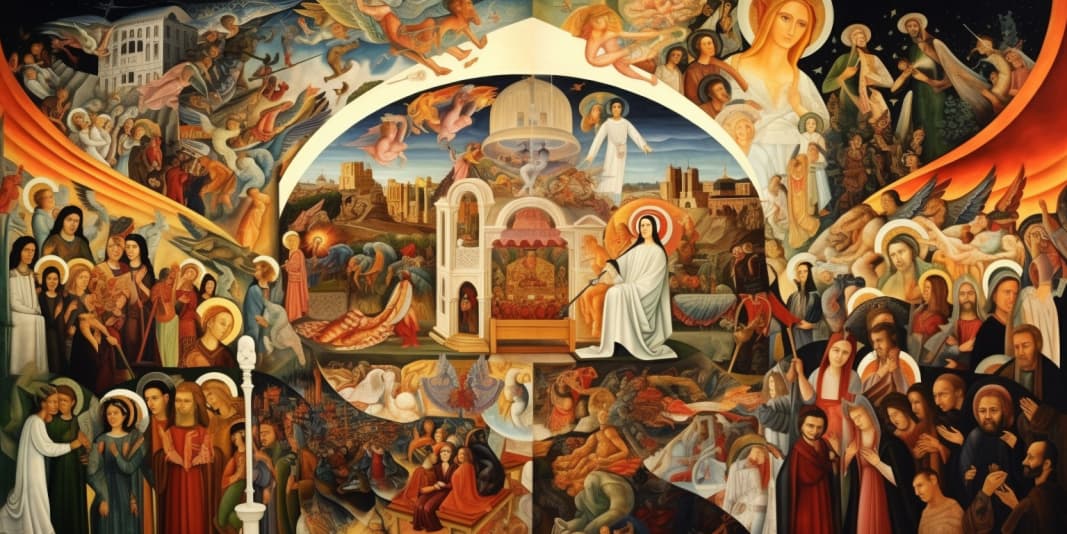While many people understand Judaism and Christianity as two separate and distinct religions, there exists a deeper relationship between them than is commonly recognized. They are, in fact, deeply intertwined, sharing a rich tapestry of historical, theological, and cultural similarities. These similarities extend to beliefs, scriptures, rituals, ethics, and concepts of God.
Historical and Theological Ties
Judaism and Christianity have strong historical ties. Both originate in the Middle East and trace their roots back to Abraham, a patriarchal figure revered in both religions.
- Monotheism: Judaism and Christianity are monotheistic religions, both believing in a single, omnipotent, omniscient, and omnipresent God;
- Abrahamic Roots: Abraham is a significant figure in both religions. In Judaism, he is the first patriarch and the progenitor of the Jewish people. In Christianity, Abraham is seen as a forebear of Jesus through his lineage;
- Messianic Expectation: Judaism and Christianity both hold messianic expectations. While Jews await the Messiah for the first time, Christians believe Jesus was the Messiah and anticipate his second coming.
| Judaism | Christianity |
|---|---|
| Monotheistic | Monotheistic |
| Roots in Abraham | Roots in Abraham |
| Awaits the Messiah | Awaits the second coming of the Messiah |
Shared Scriptures
The Jewish Tanakh and the Christian Old Testament share many books. Although they are arranged differently, they carry similar stories, laws, prophecies, and wisdom.
- Torah/Pentateuch: The Torah in Judaism, also known as the Pentateuch in Christianity, is composed of the first five books of the Bible (Genesis, Exodus, Leviticus, Numbers, and Deuteronomy);
- Prophets: Both religions revere figures such as Moses, Elijah, and Isaiah, recognizing their prophetic roles;
- Psalms and Wisdom Literature: Jewish and Christian scriptures contain Psalms and other wisdom literature, providing spiritual insight, guidance, and worship elements.
Moral and Ethical Standards
Judaism and Christianity uphold similar ethical standards, originating from the Ten Commandments and expanded upon in both religions’ scriptures.
- Ten Commandments: The Decalogue, given to Moses on Mount Sinai, forms a moral backbone for both religions;
- Golden Rule: Judaism’s version is “What is hateful to you, do not do to your fellow”, while Christianity phrases it as “Do unto others as you would have them do unto you”;
- Social Justice: Both religions emphasize care for the poor, the widow, the orphan, and the stranger, promoting a strong sense of social justice and community responsibility.
Concepts of God
The Jewish and Christian conceptions of God bear a striking resemblance.
- God as Creator: Both religions affirm God as the creator of the universe, setting the foundation for a relationship between God and creation;
- God as Lawgiver: In both Judaism and Christianity, God is seen as a lawgiver who has established moral and religious principles for humans to follow;
- God as Loving and Merciful: Judaism and Christianity share the concept of a loving and merciful God. God’s love and mercy are emphasized in the scriptures of both religions.
Conclusion
Despite significant differences, the commonalities between Judaism and Christianity are profound. They share a foundational ethical system, a significant portion of sacred scriptures, and deep-rooted theological beliefs about God. Recognizing these similarities allows for a richer understanding of these two world religions, highlighting their shared heritage while respecting their unique identities. This mutual understanding fosters dialogue, builds bridges, and promotes peace.
FAQs
Yes, Christians believe in the Old Testament, although interpretations of its laws and prophecies can differ from Judaism, especially in light of the New Testament teachings.
In Judaism, the Messiah is a future Jewish king from the Davidic line, who will rule the Jewish people during the Messianic Age. In Christianity, Jesus is considered the Messiah who has already come and will return a second time.
Both religions believe in an afterlife, but their interpretations vary. Judaism has diverse views, ranging from resurrection to an ongoing spiritual journey. Christianity generally believes in Heaven and Hell, with eternal life through faith in Jesus.
While some rituals are similar, such as prayer and reading from scriptures, there are many differences. Christianity celebrates sacraments like Eucharist and Baptism, while Judaism observes rituals like Shabbat and Passover.


No Responses